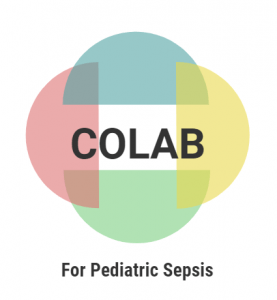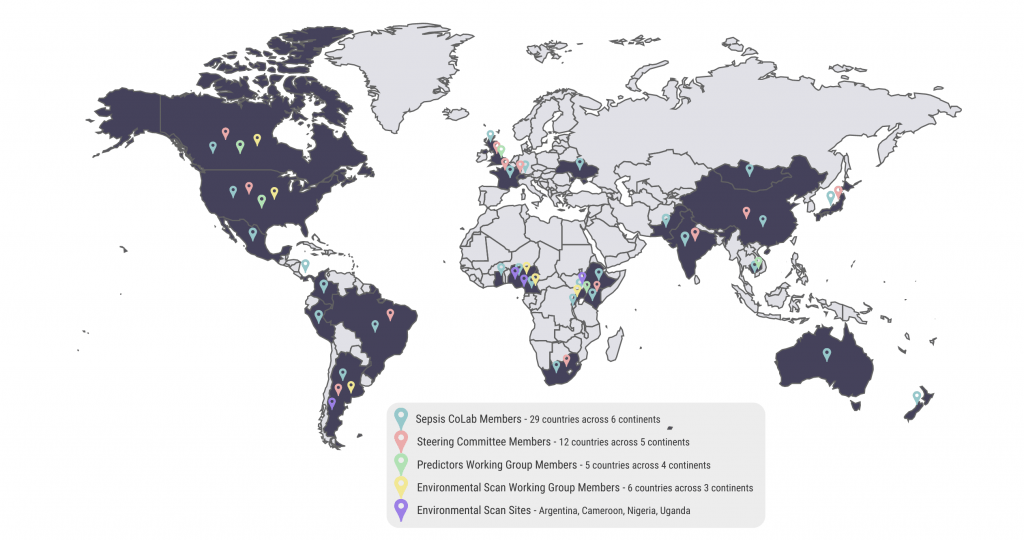
About Us
The Pediatric Sepsis Data CoLaboratory (Sepsis CoLab) is an international data-sharing network of healthcare workers, policy makers, researchers, and advocacy partners collaborating to address the high burden of pediatric sepsis mortality and morbidity globally.
Worldwide, at least 11 million people die every year due to sepsis (severe infections), the majority in low- and middle-income countries. Most of these deaths are treatable and preventable. To help us prevent these deaths, we need to collect accurate information on patients to help health care workers make individual treatment decisions. In addition, collecting this data can also help hospitals gain insight into facility-wide processes, leading to a better understanding of the safety, quality, and efficiency of their care. Unfortunately, accurate data collection is often challenging in under-resourced areas.
The vision for the Sepsis CoLab arose out of the recognition that despite important milestones recently achieved in the fight against sepsis, lack of routinely collected data and coordination is hampering progress. This international network shares information and data to further common priorities among collaborators to improve sepsis treatments and outcomes. The Sepsis CoLab facilitates partnerships to develop and validate tools for data collection and data sharing, enabling continuous quality improvement of care in health facilities across the world.
The Institute for Global Health (IGH) at BC Children’s Hospital and BC Women’s Hospital + Health Centre in Vancouver, Canada, and the World Federation of Pediatric Intensive and Critical Care Societies (WFPICCS) have entered into a partnership and have launched this global network for collaboration and data-sharing to address pediatric sepsis mortality and morbidity. Targeted, investigator-driven initiatives within the network are being used to improve sepsis treatments and outcomes.
Visit the Sepsis CoLab FAQ page to learn more.
Our Focus Areas
- Patient and facility data – developing tools to enhance the collection of relevant, accurate data for research and quality improvement.
- Mobile and web applications – developing tools to inform, diagnose, advise and plan for improved outcomes using low-cost mobile technologies.
- Modelling and analytics – sharing and using information and data to draw conclusions about best courses of action
- Advocacy and prevention – advocating on a facility, national, and global scale for improved guidelines and practices for improved early recognition of sepsis.
Data Curation
The Sepsis CoLab stores and shares curated data using the University of British Columbia’s Dataverse on Borealis. Borealis is a secure virtual archive for research and QI data with a rigorous data governance structure. To gain access to the Sepsis CoLab’s Dataverse, members must first sign a Memorandum of Understanding.
For more information about data sharing, visit our FAQ page.
Open Data
Open data is data that anyone can access, use and share. Opening up data provides a way to leverage scarce resources and provide broader access, leading to more discoveries without costly investments. This is key to address inequalities and improving health outcomes for improving individuals everywhere. The FAIR Data Principles provide guidance on storing and managing open data.
In health care and health research, open data can help inform health policy-making and advance our knowledge and ability to treat different diseases. By reusing and sharing data, the results of one study can be shared by many. This minimizes the discomforts and risks that might be associated with collecting data from a patient.
When choosing to make health research data open, it is also important to ensure the privacy and well-being of patients are protected. This means restricting access to certain data that might be used to personally identify individuals. Ultimately, a balance must be struck that maximizes benefits by sharing of data without risking individual safety and privacy.
Learn more about the role of open data in research in this video from Wellcome Trust:
Sepsis CoLab Network
The Sepsis CoLab network includes individuals from 29 countries across 6 continents. It is governed by our 13 member Steering Committee representing a range of regional and technical experts whose mandate is to provide support and further the success of the Sepsis Colab. The 10 member Predictors Working Group was formed to facilitate the standardization of predictor variables collected in pediatric sepsis studies to maximize the usability of shared data. The 13 member Environmental Scan Working Group aims to develop, refine, and implement and open-access survey to determine facility readiness to provide pediatric sepsis care in low-resource settings. The newly formed Long Term Outcomes of Sepsis Working Group aims to both better understand and to improve, long term outcomes after sepsis in low resource settings. Resources developed by our working groups are available on the Sepsis CoLab’s Dataverse.
For more information about the Sepsis CoLab, visit our FAQ page.
CoLab-orate with us!
Researchers and health workers around the world have worked tirelessly over the years to advocate for better awareness, training and clinical management guidelines in sepsis. Through these efforts, sepsis was recently recognized as a priority issue through the adoption of a World Health Assembly resolution by the World Health Organization (WHO) in May 2017. In September 2020, the WHO’s first global report on sepsis was released which revealed how gaps in data have impeded on global control efforts, reinforcing the need to do more.
For those interested in joining the Sepsis CoLab, we invite you to complete our brief Membership Application here.
Sepsis CoLab Members are provided with networking opportunities and mentorship as well as access to a host of resources shared through our Dataverse, an open-source data repository, enabling them to 1) access guidelines, tools, algorithms, and many other resources; 2) access and share data through data sharing agreements; and 3) securely store data.
To learn more about the Sepsis CoLab, please contact our Project Coordinator, Jessica Trawin at Jessica.Trawin@cw.bc.ca or check us out on LinkedIn.


